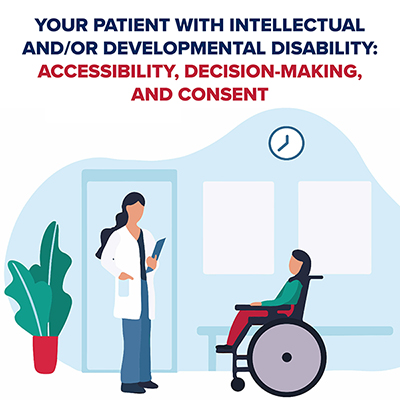Inclusive, Accessible Health Care the Focus of Free Continuing Medical Education Course
August 12, 2022

|
TUCSON, Ariz. — A new Continuing Medical Education (CME) course aimed at facilitating more equitable and accessible health care for patients with intellectual and/or developmental disabilities (I/DD) is available through the University of Arizona Sonoran Center for Excellence in Disabilities.
The CME is a free and self-directed online course for physicians, nurse practitioners, and other licensed health care providers who require continuing education. Course completion grants three CME credit hours toward license renewal.
The course was developed by the UArizona Department of Family and Community Medicine’s Julie Armin, PhD, assistant professor and Sonoran Center affiliated faculty member, and Heather Williamson, DrPH, associate professor of occupational therapy at Northern Arizona University.
“The idea for the course arose from another of our research projects,” said Dr. Armin. “In that project, women with disabilities, their supporters, and providers told us that health care providers are not often aware of best practices for working with patients with I/DD.”
National research has also found that primary care providers hold biases about people with disabilities and need more information and support in providing more comprehensive and equitable care for their patients who have disabilities.
Drs. Armin and Williamson expect the course will help people with disabilities feel more seen and heard by their primary care provider.
The course consists of three modules. The first module is focused on understanding the health inequities faced by people with I/DD, and ways the health care environment can be more accessible. The second module is about informed consent for people with I/DD. The third module establishes the concept of supported decision-making and how to apply it within a health care setting.
“There are interactive quizzes, videos, and virtual activities throughout the course to keep the learner engaged,” Dr. Williamson said. “A resource guide can also be downloaded and kept for the health providers to reference when working with individuals with I/DD in practice.”
Funding for course development came from the Arizona Developmental Disabilities Planning Council, which found through a 2020 survey that Arizona residents with disabilities identified better interaction with medical care providers as the highest priority for self-advocates.
“The work of Drs. Armin and Williamson is addressing a recognized need for awareness and education among both health care providers and members of the I/DD community, and it is a privilege for the Arizona Developmental Disabilities Planning Council to have a role in supporting this effort,” said Jon Meyers, executive director of the Arizona Developmental Disabilities Planning Council.
The CME helps address the need for awareness and education through a discussion about supported decision-making.
“Supported decision-making provides a formal structure other than guardianship for assisting people who may have limitations in their decision-making abilities,” said Tamsen Bassford, MD, associate professor, UArizona Department of Family and Community Medicine. “Most people, neurotypical or not, have supporters in their lives from whom they get advice for big decisions. This formalizes that relationship for someone with intellectual disabilities.”
Dr. Bassford provided subject matter expertise in the development of the course as a co-investigator on the project team.
A project steering committee comprised of physicians, nurse practitioners, self-advocates, and leaders within Arizona’s health care systems also provided guidance and direction.
“This unique and highly valuable CME helps primary care practitioners understand and communicate to effectively guide adults with developmental disabilities regarding their health care decision making processes,” said Audrey Russell-Kibble, a steering committee member and retired UArizona College of Nursing clinical assistant professor. “This information is helpful for the patient, their families, and our communities.”
The CME, titled “Your Patient with Intellectual and/or Developmental Disability: Accessibility, Decision-Making and Consent” can be accessed through the Sonoran Center for Excellence in Disabilities website: https://sonoranucedd.fcm.arizona.edu/primary-care-provider-continuing-medical-education-program
Media Contact:
Darci Slaten
[email protected]
Program Contact:
Julie Armin, PhD
[email protected]
About the Sonoran Center for Excellence in Disabilities
Established in 2006, the Sonoran Center for Excellence in Disabilities was created through a grant from the U.S. Department of Health and Human Services, Administration on Intellectual and Developmental Disabilities. Housed within the Department of Family and Community Medicine, the Sonoran Center works closely with university, state and local disability agencies and community groups to ensure individuals with intellectual and developmental disabilities have the supports they need to participate fully in their community.
About the University of Arizona Department of Family and Community Medicine
The Department of Family and Community Medicine at the UArizona College of Medicine – Tucson is one of the top-ranking family medicine programs in the country. The department is known for outstanding pre- and post-doctoral education, groundbreaking research and innovative community outreach programs designed to improve the health of individuals, families and communities in the region and beyond. The department places strong emphasis on research, particularly in the fields of tobacco cessation, substance abuse, obesity and related diseases, cancer survivorship, behavioral health and disabilities, and Native American and Latino health. For more information: https://www.fcm.arizona.edu (Follow us: Facebook | YouTube).







